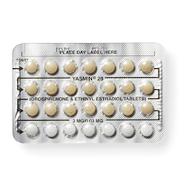Birth control and heart attacks and strokes—oh my!
Nothing in life is risk free. But it's nice when the risks are low.

“Nothing in life is risk free, and that includes birth control.” Margaret Polaneczky, MD, comes to this simple, spot-on conclusion in her post about a new study on hormonal birth control and women’s risk of heart attack or stroke. The good news? The risks with even the riskiest of types of birth control are still pretty low.
We already had evidence that some combined hormonal contraceptives (CHCs)—contraceptives that contain both a progestin and estrogen—increase the risk of heart attacks and strokes compared to methods with no estrogen. The researchers conclude that the benefits of these methods still outweigh the risks, especially for women who are healthy to begin with.
Noteworthy details?
The older you are, the higher your risk of heart attack or stroke—regardless of what kind of birth control you use.
This study is brand new, but the findings support earlier research from the same authors, which we referred to for our article “Risky business 2: Migraines, high blood pressure, and blood clots.” In fact, the new study found that the greatest risk of heart attack or stroke for any type of CHC was 1 per ~1,500—a lower risk than the most conservative previous estimates.
This study supports previous research showing that the risk of blood clots with methods that contain estrogen is still much lower than the risk that comes with pregnancy.
Differences in risk between various types/doses of estrogen and progestin were minor—so there’s no need to switch from a method that’s working for you.
The study didn’t have complete data on how many participants were smokers, though they tried to account for smoking in other ways. Still, since smoking is known to increase the risk of heart attack and stroke, it would have been useful to know exactly how this factored into the results.
Body mass index (BMI) can also affect the likelihood of heart attack or stroke, but that wasn’t included in the study either.
Take-away, please?
As the authors of the study emphasized, the main message to take away here is that though some birth control options are riskier than others, all of the available options make up for the risks in benefits—contraceptive and otherwise. On the other hand, for women with risk factors for heart attack or stroke, or for those who are just uncomfortable with the idea of any sort of elevated risk, there are plenty of methods—like the IUD, the implant, and the shot—that work really well and don’t affect the risk of heart attack or stroke. Did someone say win-win?
How do you feel about this article?

Heat up your weekends with our best sex tips and so much more.
